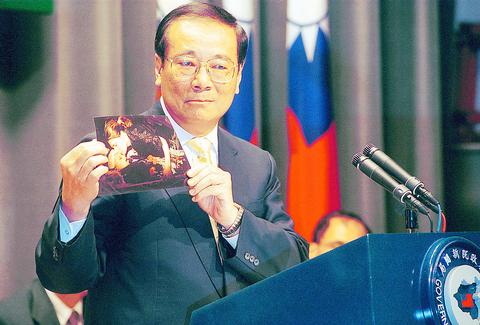The DPP-led Cabinet, ushering in its second year, will have to excell itself in the economic and financial fields in order to win back the public's confidence, political observers said.
"They [members of the Cabinet with economic and financial portfolios] may not be the best team, but they've been in operation for a year and understand the DPP government's policies well," DPP Legislator Lee Wen-chung (李文忠) said.

The economic downturn from which Taiwan is currently suffering has hobbled the DPP's first year in office. The Cabinet has not fully demonstrated to the public that it can take total control of the country's economic development since, as some DPP officials have argued, most Cabinet members who deal with financial and economic issues are former KMT officials. But Lee believed that overall the Cabinet is heading in the right direction.
Lee therefore ruled out the possibility of a Cabinet reshuffle before the year-end elections, though he supported the idea of forming a coalition Cabinet after polling takes place.
When evaluating the Cabinet's performance for the past year, Lee stressed the importance of President Chen Shui-bian's (
Minister without portfolio, Chung Chin (
"But the Cabinet will still have to fine tune its policies to improve the interaction and communication between itself and the legislature," Chung said, stressing that past standoffs between the executive and legislative branches has triggered severe political instability.
The standoff intensified when Premier Chang Chun-hsiung (張俊雄) announced last October that he had unilaterally decided to scrap the Fourth Nuclear Power Plant (核四) without the legislature's consent. For this, Chang was branded "persona non grata" and kept out of all legislative functions for almost three months.
Lawmakers from opposition parties expressed their disappointment with the Cabinet's lack of respect for the rule of law over the past year.
"The DPP government's obvious attempts to challenge the majority-controlled legislature has had a negative impact on its rule," KMT Legislator Chen Hung-chi (陳鴻基) said.
Chen criticized the DPP government for being adept at shifting blame on to opposition parties by saying that "all its difficulties in office stem from the old KMT regime and its own failure to seize a majority of seats in the legislature."
He urged the Cabinet to learn from past mistakes and work out how to reach compromises when inter-party negotiations were involved.
In spite of the criticisms leveled at the Cabinet, the premier said he was very much satisfied with the Ministry of Justice's efforts to eradicate "black gold."
"For the past year, the Cabinet's efforts to crack down on black gold has earned the approval of the public," Chang said on Tuesday.
Echoing Chang's view, former premier Tang also said that of all the members of the Cabinet, Minister of Justice Chen Ding-nan (陳定南) had impressed him the most.
"A lot of people say that [Chen Ding-nan] is a ruthless government official, but I found that he was a man of discipline after having worked with him. He is truly an honest and upright functionary," Tang was quoted as saying in an interview with the Chinese-language press recently.
Tang also said that his four months in office helped decrease the hostility felt within the DPP and by Chen himself of the military, which in the past looked askance at the then opposition's pro-independence leanings.

The CIA has a message for Chinese government officials worried about their place in Chinese President Xi Jinping’s (習近平) government: Come work with us. The agency released two Mandarin-language videos on social media on Thursday inviting disgruntled officials to contact the CIA. The recruitment videos posted on YouTube and X racked up more than 5 million views combined in their first day. The outreach comes as CIA Director John Ratcliffe has vowed to boost the agency’s use of intelligence from human sources and its focus on China, which has recently targeted US officials with its own espionage operations. The videos are “aimed at

STEADFAST FRIEND: The bills encourage increased Taiwan-US engagement and address China’s distortion of UN Resolution 2758 to isolate Taiwan internationally The Presidential Office yesterday thanked the US House of Representatives for unanimously passing two Taiwan-related bills highlighting its solid support for Taiwan’s democracy and global participation, and for deepening bilateral relations. One of the bills, the Taiwan Assurance Implementation Act, requires the US Department of State to periodically review its guidelines for engagement with Taiwan, and report to the US Congress on the guidelines and plans to lift self-imposed limitations on US-Taiwan engagement. The other bill is the Taiwan International Solidarity Act, which clarifies that UN Resolution 2758 does not address the issue of the representation of Taiwan or its people in

US Indo-Pacific Commander Admiral Samuel Paparo on Friday expressed concern over the rate at which China is diversifying its military exercises, the Financial Times (FT) reported on Saturday. “The rates of change on the depth and breadth of their exercises is the one non-linear effect that I’ve seen in the last year that wakes me up at night or keeps me up at night,” Paparo was quoted by FT as saying while attending the annual Sedona Forum at the McCain Institute in Arizona. Paparo also expressed concern over the speed with which China was expanding its military. While the US

SHIFT: Taiwan’s better-than-expected first-quarter GDP and signs of weakness in the US have driven global capital back to emerging markets, the central bank head said The central bank yesterday blamed market speculation for the steep rise in the local currency, and urged exporters and financial institutions to stay calm and stop panic sell-offs to avoid hurting their own profitability. The nation’s top monetary policymaker said that it would step in, if necessary, to maintain order and stability in the foreign exchange market. The remarks came as the NT dollar yesterday closed up NT$0.919 to NT$30.145 against the US dollar in Taipei trading, after rising as high as NT$29.59 in intraday trading. The local currency has surged 5.85 percent against the greenback over the past two sessions, central